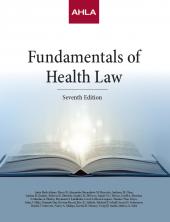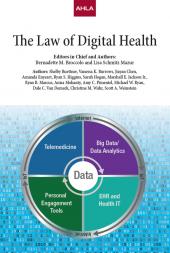AHLA Fundamentals of Health Law (Non-Members)
Select a format
 International Order Inquiry
International Order Inquiry
Select subscription type
Terms & conditions
Subscribers receive the product(s) listed on the Order Form and any Updates made available during the annual subscription period. Shipping and handling fees are not included in the annual price.
Subscribers are advised of the number of Updates that were made to the particular publication the prior year. The number of Updates may vary due to developments in the law and other publishing issues, but subscribers may use this as a rough estimate of future shipments. Subscribers may call Customer Support at 800-833-9844 for additional information.
Subscribers may cancel this subscription by: calling Customer Support at 800-833-9844; emailing customer.support@lexisnexis.com; or returning the invoice marked "CANCEL".
If subscribers cancel within 30 days after the product is ordered or received and return the product at their expense, then they will receive a full credit of the price for the annual subscription.
If subscribers cancel between 31 and 60 days after the invoice date and return the product at their expense, then they will receive a 5/6th credit of the price for the annual subscription. No credit will be given for cancellations more than 60 days after the invoice date. To receive any credit, subscriber must return all product(s) shipped during the year at their expense within the applicable cancellation period listed above.
Subscribers receive the product(s) listed on the Order Form and any Updates made available during the annual subscription period. Shipping and handling fees are not included in the annual price.
Subscribers are advised of the number of Updates that were made to the particular publication the prior year. The number of Updates may vary due to developments in the law and other publishing issues, but subscribers may use this as a rough estimate of future shipments. Subscribers may call Customer Support at 800-833-9844 for additional information.
Subscribers may cancel this subscription by: calling Customer Support at 800-833-9844; emailing customer.support@lexisnexis.com; or returning the invoice marked 'CANCEL'.
If subscribers cancel within 30 days after the product is ordered or received and return the product at their expense, then they will receive a full credit of the price for the annual subscription.
If subscribers cancel between 31 and 60 days after the invoice date and return the product at their expense, then they will receive a 5/6th credit of the price for the annual subscription. No credit will be given for cancellations more than 60 days after the invoice date. To receive any credit, subscriber must return all product(s) shipped during the year at their expense within the applicable cancellation period listed above.
Product description
Special student discounts are available for this title. Please call 1.800.533.1637 for details.
View or download Chapter 5 for this product.
This Seventh Edition of AHLA's Fundamentals of Health Law is a comprehensive resource for individuals who need to understand not only fundamental health law requirements, but also the complex web of legal relationships among patients, providers, suppliers, payers, technology vendors, researchers, and others. There are two additional chapters on Medicaid and Data Sharing.
- Health Law Terminology;
- Patient Care;
- Medicare;
- Medicaid;
- Fraud and Abuse;
- Tax-Exemption;
- Antitrust;
- Regulation of Private Health Plans;
- Regulation of Hospitals;
- Representing Physicians;
- Post-Acute Providers and Suppliers;
- Health Care Transactions and Contracting;
- Bioethics;
- Data Sharing; and
- Dispute Resolution.
- Increased industry integration
- Physician employment
- The 21st Century Cures Act
- Health Insurance Portability and Accountability Act (HIPAA) guidance
- Fraud enforcement
- Evolution of payment schemes, including the Medicare Access and CHIP Reauthorization Act (MACRA)
- Legislative and regulatory changes, United States Supreme Court decisions, and more.
eBooks, CDs, downloadable content, and software purchases are noncancelable, nonrefundable and nonreturnable. Click here for more information about LexisNexis eBooks. The eBook versions of this title may feature links to Lexis+® service for further legal research options. A valid subscription to Lexis+ is required to access this content.
Published April, 2018.
Table of contents
CONTENTS
Chapter 1 Terminology
1.1 Glossary
1.2 Table of Acronyms and Abbreviations
Chapter 2 Patient Care
2.1 Creation of the Provider-Patient Relationship; Duty to Treat and Ending Provider-Patient Relationships; Patient Abandonment
2.2 Consent to Medical Treatment
2.3 End-of-Life Decision Making
2.4 Disclosure and Protection of Patient Medical Information
2.5 Conclusion
Chapter 3 Medicare
3.1 Introduction
3.2 Overview of the Medicare Program
3.3 Program Administration
3.4 Reimbursement Overview
3.5 Eligibility
3.6 Coverage
3.7 Certification
3.8 Payment—The Prospective Payment System
3.9 Payment—The Resource-Based Relative Value Scale Fee Schedule
3.10 Payment—Blended Capitation
3.11 Payment—New Competitive "Market-Based" Systems
3.12 Assignment and Reassignment
3.13 Appeals—Parts A and B
3.14 Appeals—Part C
3.15 Appeals—Part D
3.16 Conclusion
3.17 Useful Websites and Other Resources
Chapter 4 Medicaid Fundamentals
4.1 Introduction
4.2 The Evolution of the Medicaid Program
4.3 Administration
4.4 Eligibility
4.5 Covered Benefits
4.6 Reimbursement and Financing Mechanisms
4.7 Delivery Systems
4.8 Affordable Care Act of 2010
4.9 SCOTUS & Medicaid Impact
Chapter 5 Fundamentals of Health Law Fraud and Abuse
5.1 The Federal Health Care Program's Anti-Kickback Statute
5.2 Federal Anti-Kickback Safe Harbor Regulations
5.3 Federal "Sunshine Law"
5.4 Federal Physician Self-Referral Law
5.5 Stark Exceptions
5.6 Federal Criminal Prohibitions Against False Claims and Fraudulent Billing Practices
5.7 Federal Civil Prohibitions Against False Claims and Fraudulent Billing Practices
5.8 Corporate Compliance Programs
Chapter 6 Tax-Exempt Issues
6.1 Introduction
6.2 Exemption Requirements—Generally
6.3 Practical Application of the Fundamental Exemption Requirements
6.4 Section 509(a) Public Charity Status
Chapter 7 Antitrust Law
7.1 Introduction
7.2 The Substantive Antitrust Statutes and Their Analyses
7.3 Exemptions, Immunities, and Scope of Coverage
7.4 Government Enforcement
7.5 Private Enforcement
7.6 Conclusion
7.7 References
Chapter 8 The Source of Payment: The State and Federal Regulation of Private Health Care Plans
8.1 The Basis of Regulation
8.2 The State Regulation of Private Health Care Plans
8.3 The Federal Regulation of Private Health Care Plans
8.4 Conclusion
Chapter 9 Regulation of Hospitals
9.1 Introduction
9.2 State and Local Regulations
9.3 Federal Regulation
9.4 Accreditation; Survey Activity
Chapter 10 Representing Physicians
10.1 Introduction
10.2 Life Cycle of Physician-Practice Association
10.3 Physician/Hospital Arrangements
10.4 Licensure and Credentialing
10.5 Reimbursement Issues
10.6 Telemedicine
10.7 Physician/Patient Relationships
10.8 Accountable Care Organizations
10.9 Conclusion
Chapter 11 Post-Acute Providers and Suppliers
11.1 Introduction
11.2 Home Medical Equipment Suppliers
11.3 Home Health Care
11.4 Hospice Care
11.5 Long Term Care
11.6 Home and Community-Based Services—Long Term Services and Supports
Chapter 12 Health Care Transactions and Contracting
12.1 Introduction
12.2 Getting Started: Initial Discussions and Preliminary Documents
12.3 Structure of Health Care Transactions
12.4 Health Care Corporate Structures
12.5 Key Issues in Structuring Transactions
12.6 Unwinding Transactions
12.7 Types of Health Care Contracts
12.8 Termination of Agreements
12.9 Current Climate of Health Care Transactions and Contracting
Chapter 13 Bioethics
13.1 Human Reproduction
13.2 Organ Transplantation
13.3 The New Genetics
13.4 Conclusion
Chapter 14 Data Sharing for Clinical Integration and other "Big Data" Initiatives
14.1 Introduction
14.2 Health Insurance Portability and Accountability Act (HIPAA)
14.3 Federal Confidentiality of Substance Use Disorder (Alcohol and Drug Abuse) Patient Records
14.4 State Privacy Laws
14.5 Common Rule
14.6 Antitrust
14.7 Nonprofit Tax Exemption
Chapter 15 Dispute Resolution
15.1 Introduction
15.2 Arbitration
15.3 Mediation
15.4 Conflict Management
15.5 Conclusion
Index




